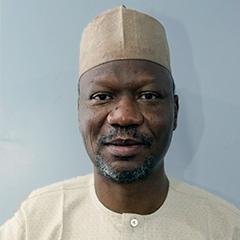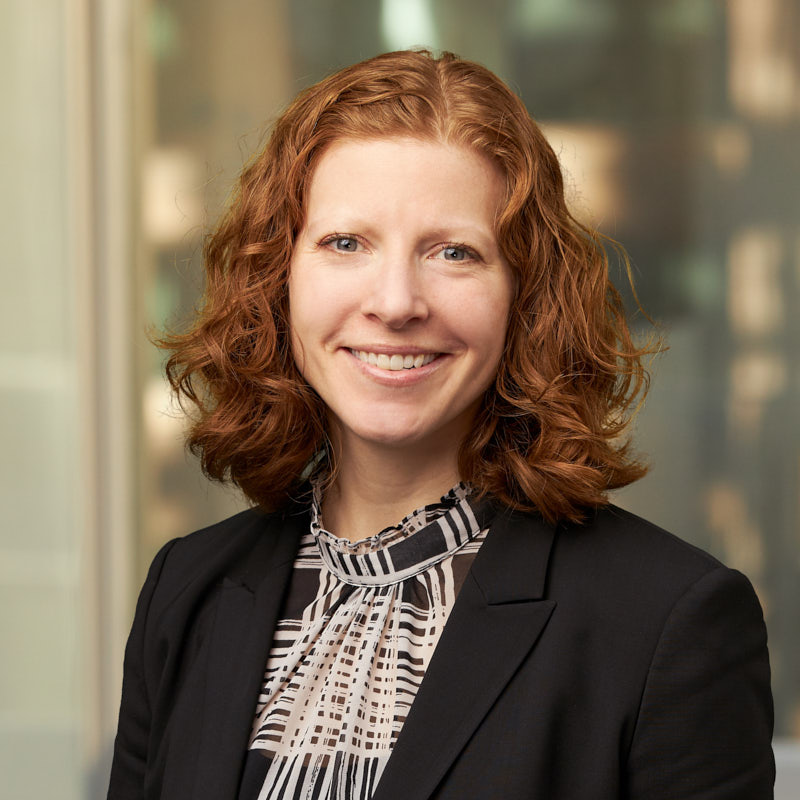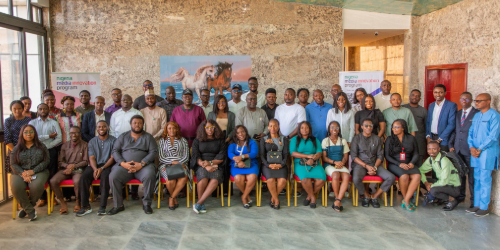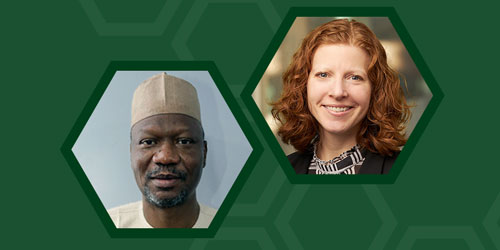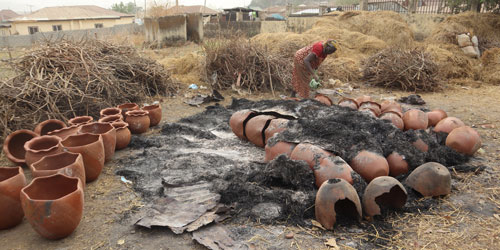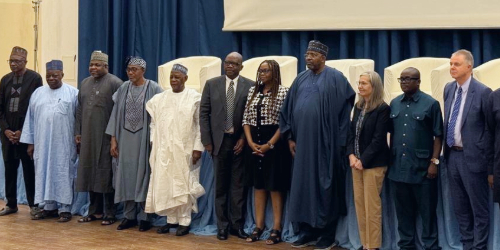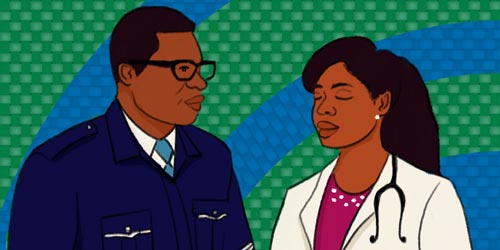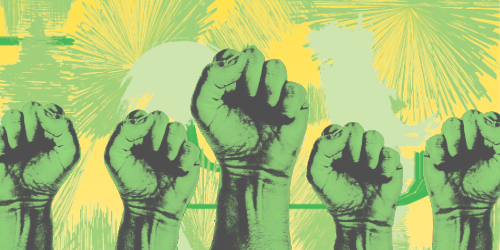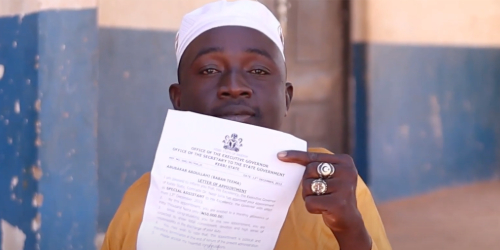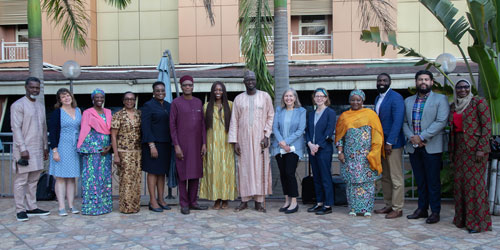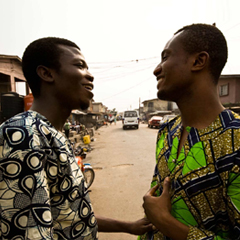Kole Shettima and Erin Sines, Co-Directors of On Nigeria, discuss community collaboration and priorities for inclusion of gender and disability in anti-corruption work in Nigeria.
In October 2022, our team had the pleasure and privilege of hosting the first in-person On Nigeria grantee meeting since 2019. We experienced all the emotions that you might imagine–gratitude, anxiety, happiness, and exhilaration. Over the last three years, there were many times when it felt like we might never be able to gather safely again. And yet, there we were, sharing meals, sitting next to each other, and catching up. We were struck by how the work and the On Nigeria program have matured since our last physical gathering. Ideas that once only existed in proposal narratives were now full-fledged programs that were serving people.
The experience made December 2024, our program’s planned end-date, feel closer than ever. It stoked our urge to push ahead and see how much more we can do before the program ends. Over the next two years, we will continue to use all available Foundation resources to support grantee partners to strengthen and diversify the accountability ecosystem in Nigeria. This ecosystem, comprising civil society, the media, community members, and government partners, is critical for Nigeria’s anti-corruption and pro-accountability movement—as well as its civic space, democracy, development, human rights, and rule of law. A diverse accountability ecosystem ensures that the aspirations and needs of the most marginalized—women, young people and children, people with disabilities, and other typically excluded groups—are known and prioritized by all partners.
Partnerships, collaboration, and information sharing are necessary to create and sustain this vigorous accountability ecosystem. On Nigeria’s grantee cohorts are built on the idea that when like-minded organizations coordinate efforts and, when appropriate, form demand-driven partnerships, they can achieve more together. At the meeting, grantee partners consistently shared with us that they want more opportunities to get to know one another, interact, and collectively strategize about their work. Results of a new analysis by EnCompass, our evaluation and learning partner, showed that grantees are working together and with a range of other partners, but there is room to deepen those connections. Since the On Nigeria team will not always be there to convene partners, we have more to do to strengthen, deepen, and diversify the ecosystem, so it continues to thrive beyond the life of our program.
We also feel urgency around our gender equity and social inclusion (GESI) ambitions and values. We outlined our GESI commitment last year and shared several updates on learnings in the interim. Our team continues to strengthen our own GESI skills and offer resources to grantee partners so they can continue to center justice and equity in their work.
Focusing on Disability Rights
Unlike gender, the disability rights agenda is nascent in Nigeria. Estimates suggest that about 29 million Nigerians were living with some form of disability, including visual, hearing, physical, intellectual, and communication impairments. According to an internal report our team commissioned and based on 2019 research on disability by Eskay et al., “Poor women with disabilities may encounter more obstacles than men with disabilities, as multiple issues intersect to reinforce their vulnerability.” Several studies have found that people with disabilities are more likely to face corruption in the health, education, and social services sector. They also face corruption in the police, judiciary, and land administration authority. Despite the passage of the Discrimination Against Persons with Disabilities (Prohibition) Act, 2018, people with disabilities continue to be excluded from economic opportunities, with less than one percent employed in the formal sector and less than two percent with access to education. More than 96 percent do not have access to assistive devices, according to the National Development Plan, 2021-25. It is clear that people with disabilities face significant barriers to participating in governance, anti-corruption, and many other aspects of public life.
Given that the disability rights agenda in Nigeria is in its early stages, we appreciate the activities that so many grantee partners are undertaking—from ensuring that people living with disabilities have the necessary accommodations to cast their votes to advocating for disability inclusion in the Open Government Partnership strategies.
The Stallion Times, an On Nigeria subgrantee, trained journalists on how to fairly and accurately report on people with disabilities. The Cable Nigeria is redesigning its website to make it accessible for people with visual and hearing impairments. At the recent Social Influencers Week, hosted by the Center for Information Technology and Development, a panelist presented on technology to enhance voter participation of people with disabilities. St Ives Media (Women FM) organized a presidential debate where candidates outlined their gender platform, and a member from the disability community spoke about the needs and aspirations of women with disabilities.
Our team is also being more intentional about centering people with disabilities by ensuring that we have representation from the disability community on the panels we host and on committees where we hold seats, by supporting the Joint National Association of People with Disabilities, and through our support to the Independent National Electoral Commission’s Gender and Social Inclusion Department. There is undoubtedly more work to do, but our partners have made admirable progress in just a few short years. We look forward to continuing to learn from them and following their lead.
We recently sent grantee partners a survey asking what they would like to see from us and what they need from us in the final two years. We rely on the honest feedback and leadership from our partners and look forward to our continued collaboration.
On Nigeria grantmaking ›
On Nigeria strategy ›
Other Director's Perspectives ›



